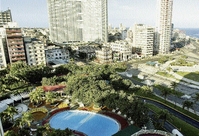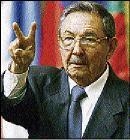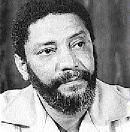Cuba libre
Published: Sunday | June 7, 2009

Edward Seaga
The historic decision taken on January 21, 1962, at the eighth Meeting of Consultation of Foreign Ministers in Uruguay by member countries of the Organisation of American State (OAS) to expel Cuba from the OAS because of its adoption of communism as a system of governance was on Wednesday, June 3, rescinded in another historic meeting in Trinidad.
For Jamaica, this was nothing new as it never agreed to accept the expulsion of Cuba as a condition for Jamaica's entry into the OAS. This was the position of only two countries. Jamaica was one, Mexico the other.
Apparently, the Cuban government wished this step to be taken to remove the humiliation of expulsion, more so than to regain membership in the organisation. Cuba has not sought to re-enter the Organisation of American States perhaps because its system of governance does not conform to the principles of democracy laid down in the Charter of the OAS. But in Cuba's case, it was not just a matter of being at variance with other member countries in how it is governed. The Constitution of Cuba went much further. Article 12 espouses the principles of "proletarian internationalism and of the combative solidarity of the people".

A January 2, 2007 overhead view of the Miramar section of Havana, Cuba.-file
a constitutional call
This was a constitutional call which empowered Cuba to interfere in struggles by the people (proletariat) elsewhere in the world. It was this affirmation that was used by Cuba to become involved with the struggles in Grenada during the Maurice Bishop period of revolutionary rule commencing with a coup on March 13, 1979. After Bishop was summarily executed by his own revolutionary government on October 19, 1983, these same constitutional principles endowed Cuba with the right to take up arms against the American and OECS intervention forces which sought to restore stability and democracy to Grenada (see my recently published, The Grenada Intervention: the Inside Story).
The defeat by the intervention forces of the resistance by Grenadian and Cuban revolutionaries was the turning point of the fortunes of the radical left in the region. Prior to this, communism had established a strong presence in Nicaragua and El Salvador. The English speaking-Caribbean was to be the next set of stepping stones in further expansion, the Grenadian coup having proved how easy it was to take over small virtually defenceless governments.
Since this turning point, 25 years ago, in 1983, Cuban foreign relations has adopted principles of good neighbourliness which has prompted the spirit of "live and let live" among its neighbours who no longer view Cuba as having ambitions to interfere in the domestic affairs of sovereign people. The stability of this period which was prompted by the defeat of its interests in Jamaica in an epic general election in 1980 and a peaceful but shattering end to the Cold War in 1991. With this stability internationally, Cuba turned its attention to building its own economy and reinforcing its undoubted social gains.
It is a view that far-left ideologies are doomed to economic implosion because socialism denies the individual the right of self-improvement, favouring instead enhancing the development of the state. This contradiction of the fundamental human desire for individual initiative and reward could only be sustained under a system of suppression of individual and civil rights of the people by the state.
Countless examples have established the non-productivity of socialist states resulting in a diminishing supply of economic benefits to the individual, although achieving outstanding progress in social well-being. Cuba may have become poor in economic benefits but it was rich in the social development of its people in education and health particularly.
With time and the necessity in the post-Cold War period to work on its own development, Cuba turned to state capitalism to improve its economic health. A vibrant tourism industry was created in which hotel employees were employed to the state, which in turn created a labour contract with hotels. This allowed the state to pay hotel workers at the same low level as for other productive or skilled enterprises in Cuba, while retaining the difference between the hotel wage and the lesser government payment as a surplus for the state economy. Under the strict controls of an autocratic government, it worked in the sense that high levels of skills were available to employers.
It is at this point that the turn of events now becomes more than one of expunging from the records the previous expulsion of Cuba. Here begins what could become a widening of greater opportunities for the Cuban people, as step by step, the Obama regime falls in line with regional sentiment to lift the 47-year-old American embargo on the country. The embargo is largely becoming symbolic as a barrier which, like the Berlin Wall, would break under people pressure. When the embargo is lifted, sooner or later, then the manifestation of a real 'Cuba libre' could begin, but at the expense of others.
Lifting the embargo could free Cuba to become involved in international trade based on domestic production. The country would be ideal for the garment industry, given the age-old Cuban skills in this field. Low labour rates and a disciplined workforce could enable this to be a giant industry in the region. Growth would expand further if Cubans in Florida became merchandising or contracting partners given the know-how gained during their decade of sojourn in Florida and their integration into American commerce. Such a development would certainly create an impact on the Central American, Dominican Republic and Haitian garment industries.
Likewise, the boost in visitors arrival from North America seeking to experience the Cuban mystique for themselves as tourists will transpose Cuba to a new destination orbit in the Caribbean in which it was once the shining star. The gravitational pull of this new orbit will undoubtedly impact on Caribbean and Mexican tourist industries as powerful drawing cards. The tourism prospects in this region could be greatly altered.
This scenario is still at the mapping stage because of the unsettled question of at what price could Cuba gain access to American trade. US conditions would challenge the Cuban government to restore to their previous owners property formerly owned by Cuban emigrants to the United States. This would require a mega-step by the Raul Castro government for ideological, emotional, social and economic reasons. That battle is still to be fought. It will be joined by American business wanting urgently to pluck some of the investment cherries in Cuba.
A door has been opened to a host of ideological, litigational and investment pressures which will play themselves out in the silence of the Cuban people who cannot talk for themselves.
Cuba libre then is a drink that is yet to be mixed and equally unlikely to be tasted soon. In the meantime, there is a new vista for Cubans and a renewal of the toast, "salud venceremos".
Edward Seaga is a former prime minister. He is now a distinguished fellow at the UWI and pro chancellor at UTech. Email: odf@uwimona.edu.jm or columns@gleanerjm.com.

Raul Castro

Bishop
